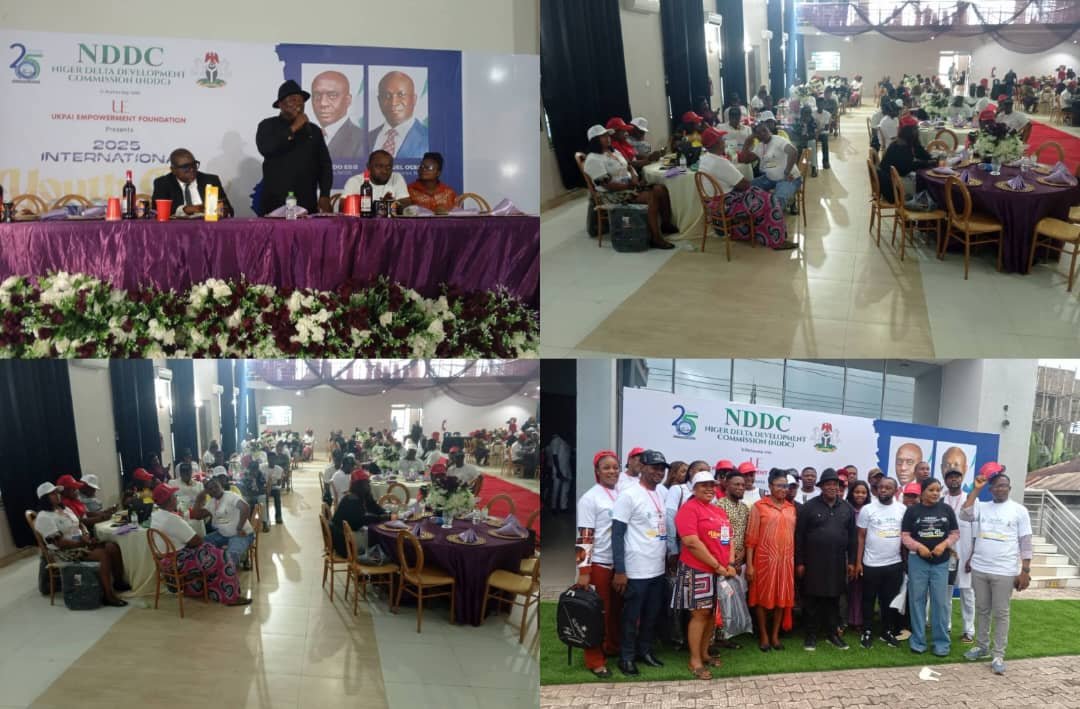Furera Isma Jumare is a seasoned development professional and the former Director General of Jigawa State Investment Promotion Agency.
In this interview with PREMIUM TIMES, Mrs Isma Jumare shares her career trajectory, leadership philosophy, and thoughts on what it means to “accelerate action” for gender equality in Nigeria.
PT: Can you tell us about your professional journey and how you became a CEO?
Mrs Isma Jumare: I started working in 1988 at CBN’s Agricultural Finance Department with a master’s degree in Crop Physiology.
During my stay there, the department transformed into the Development Finance Department. With the realisation that the Bank was beginning to take on more responsibilities in managing other development programmes outside of agriculture, I embarked on improving myself.
I pursued two master’s degrees at different times—one in Rural Development and the other in International Development Management. I also attended numerous courses that provided me with the knowledge and technical skills required to effectively carry out my duties.
Self-development is key. Do not skimp on this aspect of your career. Invest both time and money in acquiring skills that will undoubtedly keep you a step ahead of your contemporaries—ahead of others.
This approach greatly benefited me, as I retired from the Bank in 2009 and founded my consultancy, Micro Development Consulting Limited (MDCL), in 2010. Six weeks after leaving CBN, I travelled to London to obtain a certificate in training practice from the Chartered Institute of Personnel and Development.
I pursued this certification because I knew that one of my focus areas would be capacity development for organisations, institutions, and other groups.
Today, there are many opportunities to acquire any skill you need through online courses and certifications, many of which are affordable. To be successful in your journey toward becoming a CEO, industry knowledge and relevant skills are crucial.
Be versatile. As MDCL’s CEO, I joined the Chartered Institute of Directors Nigeria, where I undertook several director development courses that enabled my inclusion in the Independent Directors Register. I am currently a Fellow of the Institute.
Other roles I have held include being an Independent Consultant for FCDO’s ENABLE2 programme, member of the Kaduna State Council on Agriculture, board member of UBN Plc., and member of the Editorial Board of Leadership Newspaper.
I believe that my versatility, among other qualities, was one of the reasons I was headhunted for the role of Director General of the Jigawa State Investment Promotion Agency.
I served in this position for a little over four years as the agency’s first Director General since its establishment by law in 2016. I left the service of the Jigawa State Government in February this year.
I am also currently a member of the Board of Trustees of WIMIBIZ.
This is a glimpse into my professional journey.
PT: In your opinion, how do women leaders inspire and empower others around them, especially other women?
Mrs Isma Jumare: I will start by sharing how I was inspired by other women.
Growing up, I did not have the opportunity to undergo a structured mentorship programme. However, I was inspired by older women excelling in various fields. Watching them on TV and reading about their achievements in newspapers was motivating.
At that time, the term “iron lady” was often used to describe such women, but in reality, they were simply hardworking, professional, and no-nonsense individuals. I aspired to be that kind of “no-nonsense” woman too.
To answer the question, I believe that when women in leadership excel in their roles, working with integrity and diligence, they inspire younger women, just as they inspired me.
When women leaders mentor younger women, or even younger men, by taking them under their wings as part of their teams, assigning them roles, responsibilities, and tasks under their guidance, it ignites a passion in them and a desire to aspire to leadership roles.
Being present and supportive makes a difference. I look at women like Amina Mohammed, who has mentored young women, and I am certain that those women will grow to become whatever they aspire to be in life.
PT: What do you think is unique about women in leadership roles compared to men?
Mrs Isma Jumare: Women pay more attention to detail, can multitask, and are more empathetic.
Studies have shown that, irrespective of cultural and family influences, women across the world are naturally better at understanding how others feel.
I believe these attributes contribute to data indicating that organisations with more women, especially in management positions, experience increased productivity, enhanced collaboration, and improved financial performance, leading to higher profitability.
In essence, having more women in leadership is better for business.
PT: What challenges did you face as a woman in your industry, and how did you overcome them?
Mrs Isma Jumare: The assumption that women are the “weaker sex” and therefore incapable of handling challenging assignments and tasks that require perseverance. This is misguided.
To be honest, the only way men could have an advantage over me, for example, is in tasks that require physical strength, such as lifting heavy objects—but certainly not in intellectually demanding work.
I overcome such challenges by working as any serious professional man would—attending to my assignments diligently, applying myself assiduously, and delivering results as expected.
PT: Can you share one of the most rewarding moments in your career that solidified your passion for leadership?
Mrs Isma Jumare: Alhamdu Lillah, I’m grateful to have worked with a team that, even though its members felt I was “tough,” appreciated my insistence on doing everything professionally.
When I started, I had to build a better structure. It took time and effort. Everyone had to give their best, and we all had to make sacrifices because I set high standards. But gradually, we put an effective system in place.
My most rewarding moments as a leader were when we achieve a goal—for example when we successfully delivered on assignments, investors propose projects, or when we moved up in rankings, such as improving from 3rd to 2nd position in the sub-national Ease of Doing Business Survey, and I see the joy on my subordinates’ faces.
They would always come together as a team to thank me for guiding them. Sometimes, they would write me notes about how I was inspiring them, which I deeply appreciated.
Nothing beats that, especially since I often grilled them and sometimes thought they didn’t appreciate my effort. I will always cherish those moments of gratitude from my team. Also, something I always did was remind them that we succeeded because of teamwork.
PT: What advice would you give to young Nigerian women aspiring to become leaders in their fields?
Mrs Isma Jumare: As you grow in your career and aspire to leadership roles, invest time and money in self-development.
Acquire technical skills but also develop soft skills that will help you work effectively with different types of people and build professional relationships.
Join professional associations and networks but also engage in social networks—you may need them in the future. Be versatile and visible. Seek out mentors, especially from among women who are doing what you aspire to do and be deliberate in learning from them.
Most importantly, dare! Dare to apply for jobs you think you are not qualified for—you often are, so stop second-guessing yourself. Dare to take on challenging roles.
Strive to be known as a person of integrity, someone serious about their work is results-driven, and someone who can be relied upon.
PT: How do you balance the demands of being a CEO with other aspects of your personal life?
Mrs Isma Jumare: I had the advantage of taking on the role of Director General when my children were already grown. Only one out of five was yet to graduate when I began the job.
However, balancing work with personal life demands is always challenging, even for women who do not hold leadership positions.
We naturally want to be present for every birth, birthday, and hospital stay. We worry about our children and grandchildren. We want to volunteer in our social circles.
To be honest, a leadership role requires sacrificing much of that, and it is not easy for women with young children. I tried to engage as much as I could, but being far from my family and friends made it difficult.
I often had to put aside many of my personal plans—not just family commitments, but also active participation in social activities, such as associations and volunteering.
Where we are fortunate is that culturally we have a lot of family support. There were times I questioned whether it was all worthwhile, but seeing the impact of my work, I know it was.
PT: This year’s International Women’s Day theme is “Accelerate Action.” What does this theme mean to you and how does it reflect your leadership approach?
Mrs Isma Jumare: The world’s progress toward gender equality remains slow, making it imperative to accelerate efforts to achieve gender parity.
For me, “Accelerate Action”, the theme for this year’s International Women’s Day, reflects the fact that governments are moving at a snail’s pace. This must change.
READ ALSO: U.S. ambassador honours Nigeria’s thriving music industry at headies pre-award reception
Looking at Nigeria, the situation is concerning. For example, while the global average for female representation at all levels of government is 22.5 per cent, and the West African sub-regional average is 15 per cent, Nigeria lags far behind at just 6.7 per cent. Additionally, Nigeria ranks 139th out of 156 countries in gender parity—only 17 places ahead of Afghanistan, which ranks the lowest.
In elective office, despite women making up 50 per cent of Nigeria’s population, they hold only 3.6 per cent of National Assembly seats. Furthermore, only four states have female deputy governors, and since independence, Nigeria has never had an elected female governor.
This is alarming for a country that prides itself on being modern and forward-thinking. The government, civil society, and other stakeholders must take this as a challenge and work with speed toward meaningful improvement.
Achieving gender equality is a complex process with many nuances that require attention. Therefore, collective action and greater collaboration are crucial.
In my role as Director General, despite the limitations of my mandate, I ensured that all stakeholder consultations for our projects actively involved women and women’s groups, providing them with opportunities they might otherwise have been excluded from.
I have mentored young women who worked with me, and at one point, my consultancy had an all-female team.
However, given the dire state of gender parity in Nigeria, I believe we must all do more—especially in the area of mentorship.
This interview was conducted in partnership with Women in Management, Business, and Public Service (WIMBIZ), a Nigerian non-profit organisation committed to advancing and empowering women in leadership. Mrs Isma Jumare is also a member of WIMBIZ.
Support PREMIUM TIMES’ journalism of integrity and credibility
At Premium Times, we firmly believe in the importance of high-quality journalism. Recognizing that not everyone can afford costly news subscriptions, we are dedicated to delivering meticulously researched, fact-checked news that remains freely accessible to all.
Whether you turn to Premium Times for daily updates, in-depth investigations into pressing national issues, or entertaining trending stories, we value your readership.
It’s essential to acknowledge that news production incurs expenses, and we take pride in never placing our stories behind a prohibitive paywall.
Would you consider supporting us with a modest contribution on a monthly basis to help maintain our commitment to free, accessible news?
Make Contribution
TEXT AD: Call Willie – +2348098788999

© Premium Times









